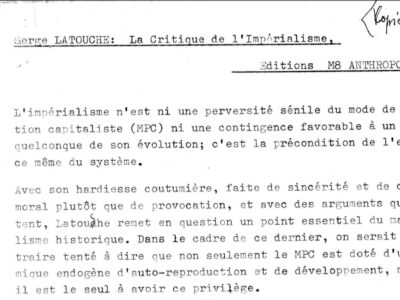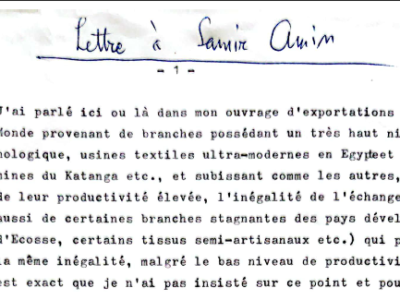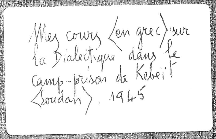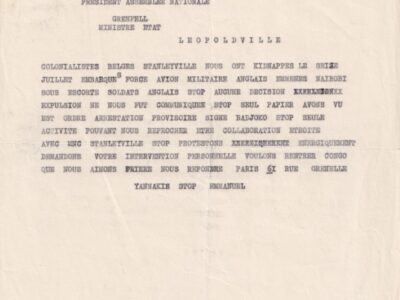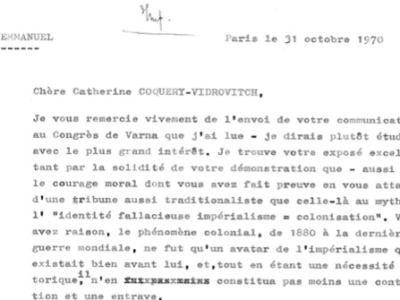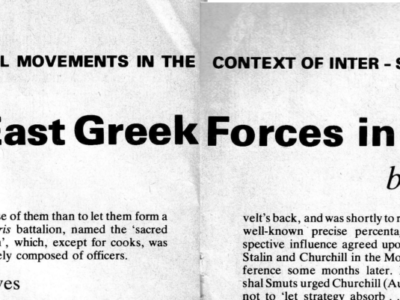Preface by Torkil Lauesen:
Emmanuel’s exchange with Anouar Abdel-Malek is based on a paper Adel-Malek presented at the Cavtat conference in Yugoslavia on the 27th of September 1976. Cavtat was a popular conference in the 70s, gathering academics such as Emmanuel, Wallerstein, Amin, Gunder Frank, Hobsbawm, and the like.
Anouar Abdel-Malek (23 October 1924 – 15 June 2012) was an Egyptian-French political scientist. He was a Pan-Arabist and a Marxist. The notion of the ‘pan-Arab state’ permeated Abdel-Malek’s work. He supported Nasser’s projects such as unity with Syria in the ’50s. He criticised the pro-Moscow Communist Party for their failure to Egyptianize leftism. Later, Abdel-Malek fled Nasser’s crackdown on communists and socialists, travelling to France in a boat and nearly losing his life in the attempt. Despite this, he continued to support Nasser’s project based on shared principles.
Keenly attuned to the work of the Zionist Lobby, Abdel Malek described Israel as a racist and imperialist state.
In his work, he also explored questions of orientalism, well before the seminal Orientalism by Edward Said published in the late ’70s. But it was not until Said’s book that attention was paid to these arguments in broader circles.
He considered Marxism not simply a weapon for national and economic liberation for the Third World, but as a means of freeing thought from Western domination, as he described it in his book, ‘Nationalism and Socialism.’
Adel-Malek’s paper is called: “The Thrust of Socialist Thought”, and begins with the statement:
The transformations of the world, since Yalta, is just beginning to be dimly perceived by political intellectuals, though it does lie at the very core of the concrete power struggle at world, regional and national levels alike. Wherefore this introductory attempts to cut across the ideological cosmopolitan smokescreen to reach for the linkage between culture and power, thought and action, in the historic field now unfolding.
It was later published in “Nation and Revolution,” Volume 2 of Malek’s huge work, Social Dialectics, in 1982.
Emmanuel’s copy of the paper is full of exclamations: Yes! No! Juste! and notes – it seems that the paper aroused strong feelings.
Emmanuel’s letter is dated 22 November 1976. Malik’s response is from 6 January 1977.
Below we reproduce the originals with translation in English. The letters were translated by Daniel Williams for Anti-Imperialist Network collective.
Emmanuel-AbdelMalek
My dear Abdel-Malek,
Since Cavtat, I have had the opportunity to carefully reread your paper and I cannot resist the temptation to share with you some thoughts.
Undoubtedly, this is a powerful blow to certain common mystifications. I admired both your verve and your depth. I agree on several points. But I can’t follow you to the end.
When you denounce the Western-centrism of traditional Marxism, I am with you. I applaud you with both hands when you notice that the current crisis in the Center is felt more like a crisis of civilization than like one of an economic system. But when you deduce that economic development is not a problem of socialist thought or you draw an argument from it (or, in any case, you continue) to approve those who, in Asia or elsewhere, condemn productivity, you are, in my opinion, yourself only projecting “universally” a point of view: in the best case, the point of view of the one who solved the problem of physical survival, at worst, the point of view of the bored rich person (“riding the metro-working-sleeping”).
I find this neo-Eurocentrism (or Chinese-centrism) more unacceptable even than the old one (which itself did not lack times of generosity). Have you ever thought about what it represents, your “cultural revolution”, whether that of the Sorbonne or that of Shanghai it matters little, for a man who, in India or in Africa, sees his child die of hunger or disease? Are you sure to be able to produce enough food and…doctors, to feed and care for all the children in the world, without a little “Stakhanovism”? If so, where do you get this certainty from, since the only discipline that could procure it you have rejected in advance as “economism”?
I understand very well that we must stop writing glosses and that we must place the sacred texts in the socio-cultural and ethno-historical environment which has conditioned their appearance. I am, likewise, very happy to see you refuse to consider peripheral revolutionary thought as the exotic pose of scientific socialism. But when you insinuate that there is no universal socialism at all of which this thought could be one of the components (component in short or in full), I’m losing my footing. In what way, then, would it concern me, a Greek from Paris?
Because, you see, the thought of Mao-Tse-Tung, in itself and for itself, I don’t care! Whether or not it brings happiness to 800 million Chinese, whether or not it brings them the most human and the most perfect system that can exist, in what way, do you want me to be interested, me who belongs to the 3 billion non-Chinese, to which the Chinese themselves on the one hand, you on the other, by virtue of “national pluralism”, you deny all right to look? On the other hand, it is quite obvious that when a Chinese, in person or through a Maoist intermediary, shoots me in Angola, as part of its “realpolitik”, this to me looks at all points of view. And it turns out that this hardly suits me.
That the national framework constitutes a historical constraint that we unfortunately underestimated, it’s not me who would speak against you. But that we must not only take it into account as a necessity, but make it a virtue; that we ourselves come to establish as a finality the manufacture of as many ad-hoc socialisms as the existing nation-states, that is beyond me.
What then is the legitimacy of the nation, apart from the existence of a state apparatus which tends to perpetuate itself in perpetuity (which is the real definition of bureaucracy)? You talk about historical national specificities which separate China from Russia. If they are only historical why not seek to abolish them? Have we given up on making history specifically on this point? Or, in what way are these specifications intrinsically larger than those which separate Uzbekisthan from Ukraine? Or Slovenia from Serbia, whose amalgam nevertheless seemed solid enough to lead a “heroic” war of national liberation?
On the other hand, what thing, other than the state apparatuses, separates the island of Cyprus from Greece? Suppose that tomorrow a communist party obedient to the Soviet Union, in all respects identical to that of East Germany, took power in the West. Do you really think that the reunification of Germany would follow automatically, one of the two state apparatuses agreeing to sabotage itself in the national interest? For my part, I do not believe that. Where is objective transcendence of the nation found?
What if it were otherwise? What if you were, despite everything, right? If there was nothing to do and nation-states turning their backs were there for eternity?
Well, in that case, you want me to tell you, between a world composed of free States of this type, organized internally according to the most sublime socialist model and pursuing cheerfully on the exterior their “realpolitik”, on the one hand, and the Pax Americana on the other hand, I, Arghiri Emmanuel, would choose without hesitation the Pax Americana.
Because there is something that you are neglecting, it seems to me, in your analysis: the atomic cataclysm. Mathematically, the risks of its triggering are an increasing function of the number of nation-states and the degree of their independence. In a world composed of States as independent as those you advocated this cataclysm becomes a virtual certainty.
So, you understand, there are no stakes commensurate with the thing. You can sacrifice yourself for your family, sacrifice your family for the good of the country, perhaps even sacrifice the country for the good of humanity; but sacrifice the whole of humanity, for…who…for what.. – it doesn’t make sense. There survival of humanity takes precedence over its liberation.
Take care! World unification has ceased to be an option. It has become a condition of his existence. From now on, the only option left is to know who will do this unification. Us or them? If we resign, it will be them,
that is to say any state superpower or the multinational corporations. We can trust them. As soon as they have completed the enslavement of the world and they will have made it their thing, they will be careful not to destroy it.
All the best,
A. Emmanuel
Paris 22.11.1976.
My dear Emmanuel,
I received your fascinating and genuine letter from November 22, on my return from Cairo, and thank you sincerely.
Here are some very quick comments, as far as I don’t think there is any deep disagreement, but only different languages.
The relationships between the economic factor and the national-cultural factor are at the very heart of the definition of different civilizational projects which must, in my opinion, concern the forces of socialism in the world.
The objective convergence of these different projects constitutes a dialectic of non-antagonistic contradictions.
I repeat – not antagonistic – by what the concept of “objective” internationalism is defined that I have always put forward, clearly and formally. In Cavtat itself, as you will remember, (or perhaps it was after your departure), I underlined loud and clear the primacy of unity and the forces of socialism in the world around the two leading poles which are the U.S.S.R. and China, which earned me the jokes and the venom of cosmopolitans of all kinds that we know-sounded good.
On the position of the national question, for me it is a question of an objective datum of concrete history, not of an ideological question, neither a historical contradiction, nor a phenomenon. The very position of the problem of different socialisms in national-cultural terms is a reality of our time. And it is the joint march forward which can progressively universalize the future, still distant, of our humanity.
There is no objective transcendence of the nation. The aim of the state apparatus is to ensure the social welfare of a historically constituted socio-economic formation and which we commonly refer to as ‘nation’. Once again, I never deal with the problems of a concrete reality starting from epistemology or ideology.
On “realpolitik”, you say that, for your part, you will choose the “Pax Americana” without hesitation. For my part, I always chose and will continue to choose the unit of the forces of socialism and national liberation in the world, in one vast strategy of historical positivity which involves, however, peaceful and often friendly coexistence
with the western area, around the United States. It’s not about no choice between ‘red and black’, ‘good and bad’ despite Manichaeism leading to atomic war. Our outlook leads to the reasoned and difficult advance of socialisms, avoiding generalized military confrontation.
On atomic war, I think like you that the survival of humanity takes precedence over its liberation. But I think the crisis even of productivist civilization, in its different
formulas, implies that this survival can only be ensured by the continuous and reasoned progress of the liberation forces and social renewal.
If the unification of the world has become the condition of its existence, then let us act together so that the forces of progress, reason and the heart take the direction. Thus, it seems to me, it is appropriate to understand the thesis of Chairman Mao Tse-tung “The East wind takes precedence over the West wind”. Such too, is it not true, the great dream of “Makros Alexandros”?
Good and Happy New Year,
Anour Abdel-Malek
6.1.1977.


